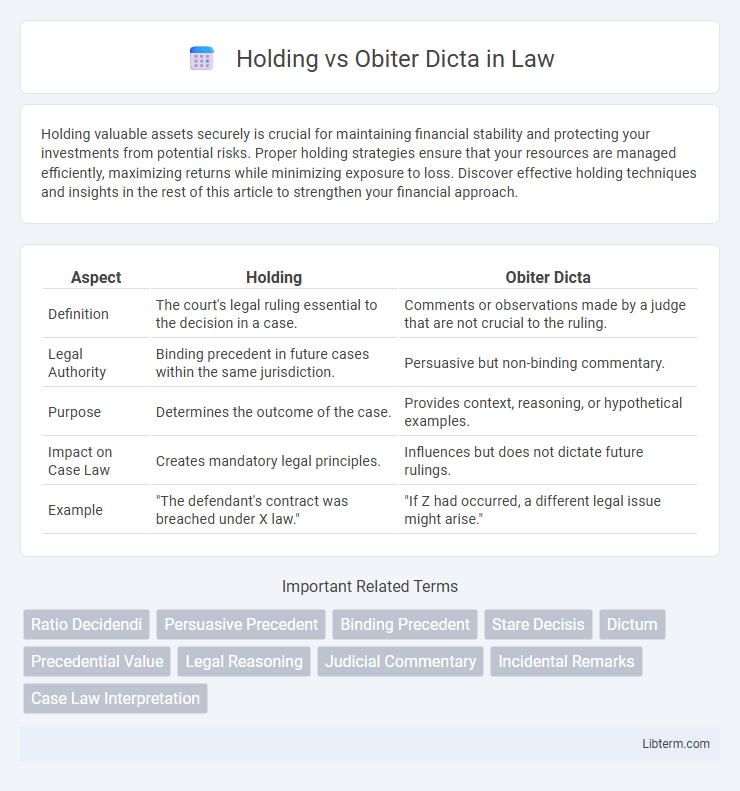Holding valuable assets securely is crucial for maintaining financial stability and protecting your investments from potential risks. Proper holding strategies ensure that your resources are managed efficiently, maximizing returns while minimizing exposure to loss. Discover effective holding techniques and insights in the rest of this article to strengthen your financial approach.
Table of Comparison
| Aspect | Holding | Obiter Dicta |
|---|---|---|
| Definition | The court's legal ruling essential to the decision in a case. | Comments or observations made by a judge that are not crucial to the ruling. |
| Legal Authority | Binding precedent in future cases within the same jurisdiction. | Persuasive but non-binding commentary. |
| Purpose | Determines the outcome of the case. | Provides context, reasoning, or hypothetical examples. |
| Impact on Case Law | Creates mandatory legal principles. | Influences but does not dictate future rulings. |
| Example | "The defendant's contract was breached under X law." | "If Z had occurred, a different legal issue might arise." |
Introduction to Holding and Obiter Dicta
Holding refers to the legal principle or rule established by a court's decision that is binding and directly addresses the issues of the case. Obiter dicta consist of remarks or observations made by a judge in a legal opinion that are not essential to the decision and therefore lack binding precedent. Distinguishing between holding and obiter dicta is crucial for understanding the authoritative weight of judicial opinions in common law systems.
Defining Holding in Judicial Decisions
Holding in judicial decisions refers to the legal principle or rule established by the court's ruling that is essential to the resolution of the case. It represents the binding precedent that lower courts must follow in future cases with similar facts or legal issues. Unlike obiter dicta, which are non-binding comments or observations made by a judge, the holding directly influences the outcome and legal framework of the dispute.
Understanding Obiter Dicta: Meaning and Scope
Obiter dicta are remarks or observations made by a judge in a legal opinion that are not essential to the decision and therefore not legally binding as precedent. These statements provide insight into the judge's thinking but do not carry the authoritative weight of the holding, which is the core ruling that resolves the case. Understanding the scope of obiter dicta helps distinguish persuasive comments from the binding principles that govern future cases.
Key Differences Between Holding and Obiter Dicta
Holding refers to the court's authoritative decision on the legal issue directly involved in the case, which creates binding precedent for future cases. Obiter dicta are the incidental remarks or observations made by a judge that are not essential to the decision and therefore lack binding authority. The key difference lies in the holding's role as binding legal precedent, while obiter dicta serve only as persuasive guidance.
Legal Significance of a Court’s Holding
The court's holding serves as the binding legal principle that directly resolves the issue in a case, establishing precedent for future rulings within the same jurisdiction. Unlike obiter dicta, which are mere comments or observations that do not carry authoritative weight, a holding is essential in shaping case law and guiding judicial decisions. Courts rely on holdings to interpret statutes and apply legal standards, ensuring consistency and predictability in the legal system.
The Role of Obiter Dicta in Judicial Reasoning
Obiter dicta, though not legally binding like the holding, play a significant role in judicial reasoning by providing insight into a judge's interpretation and approach to legal principles. These remarks offer persuasive authority that can influence future case law development and guide lower courts in analogous situations. Judges often use obiter dicta to explore hypothetical scenarios, clarify legal concepts, and signal potential shifts in legal doctrine.
Practical Implications for Legal Precedent
Holding constitutes the binding legal principle derived from a court's decision, shaping future case law by establishing precedent that lower courts must follow. Obiter dicta, comprising remarks or observations not essential to the decision, carry persuasive authority but do not bind subsequent courts, allowing for flexible interpretation and debate. Understanding the distinction informs litigators and judges on precedent applicability, influencing case strategy and judicial reasoning within common law systems.
Citing Holding vs Obiter Dicta in Legal Arguments
Citing holding in legal arguments provides authoritative precedent as it represents the court's final decision on the material facts of the case, directly binding lower courts. In contrast, obiter dicta are remarks or observations made by judges that do not form the binding part of the decision but can offer persuasive insight or guidance in similar cases. Effective legal arguments prioritize holding citations to establish mandatory precedent while using obiter dicta to support interpretation or anticipate judicial reasoning.
Common Misconceptions about Holding and Obiter Dicta
Holding refers to the legal principle or rule that is essential to the decision in a case and serves as binding precedent, while obiter dicta are incidental remarks or observations made by a judge that are not crucial to the case outcome and thus not binding. A common misconception is that obiter dicta carry the same authoritative weight as the holding, when in fact they are only persuasive and may vary in influence depending on the court's hierarchy. Confusing these concepts can lead to improper application of case law, where non-binding statements are mistakenly treated as mandatory precedent.
Conclusion: The Importance in Legal Interpretation
The holding of a case establishes the binding legal principle essential for precedent and future case decisions, making it a critical component in legal interpretation. Obiter dicta, while persuasive, consists of remarks or observations not crucial to the case's outcome and thus hold less authoritative weight. Distinguishing between holding and obiter dicta ensures accurate application of precedent and maintains clarity in judicial reasoning during legal interpretation.
Holding Infographic

 libterm.com
libterm.com